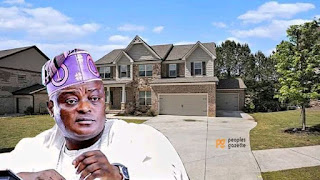The Rise and Fall of the Seemingly Impenetrable Mudashiru Obasa
When the news of Mudashiru Obasa’s impeachment as Speaker of the Lagos State House of Assembly broke, it sent shockwaves through the political landscape. Many dismissed it as hearsay or political gossip. For years, Obasa had cultivated a reputation of invincibility, commanding respect and fear alike. Even former Lagos State Governor Akinwunmi Ambode, who endured Obasa’s political machinations, could attest to the former Speaker’s perceived impenetrability.
Obasa’s influence stemmed from his strategic proximity to Nigeria’s corridors of power, especially his connections to President Bola Tinubu. In the Lagos Assembly, he acted with the authority of a kingmaker, often overshadowing the governor himself. He showed little regard for Governor Babajide Sanwo-Olu and his deputy, Dr Obafemi Hamzat, openly challenging their authority. Yet, his dramatic fall from grace came while he was away in the United States, as lawmakers orchestrated his impeachment for alleged gross misconduct.
The Meteoric Rise of Obasa
Born on 11 November 1972, Mudashiru Obasa began his political journey as a councillor in Agege Local Government under the Alliance for Democracy in 1999, serving until 2002. In 2007, he secured a seat in the Lagos State House of Assembly, representing Agege Constituency I. Obasa’s political star continued to rise as he won re-elections in 2011, 2015, 2019, and 2023.
His tenure as Speaker began in June 2015, a position he held for nine years before his impeachment. Had he completed his term in 2027, he would have become the longest-serving Speaker in Lagos Assembly history, surpassing Adeyemi Ikuforiji, who served for 10 years.
Obasa wielded immense power, largely due to his close ties to Tinubu’s political camp in Bourdillon. His influence reached a peak during Ambode’s tenure as governor, where he almost singlehandedly frustrated the administration and blocked the governor’s budget presentation. Obasa’s confidence soared further with Tinubu’s election as President in 2023, solidifying his dominance in Lagos politics. Critics began labelling him as “arrogant” due to his perceived disregard for authority.
The Tumultuous Fall of Obasa
Like the Biblical King Uzziah, whose pride led to his downfall, Obasa’s unchecked power became his undoing. His defiance of political allies and the very forces that had shielded him triggered his downfall, culminating in a political collapse as dramatic as his rise.
What Led to His Downfall?
1. Clashes with Sanwo-Olu and Hamzat
Obasa’s relationship with Governor Sanwo-Olu was marred by discord. In 2023, under Obasa’s leadership, the Assembly rejected 16 of Sanwo-Olu’s nominees for commissioner appointments. When the governor submitted a revised list, Obasa’s Assembly still dropped some nominees, signalling a full-blown power struggle.
During the 2024 budget presentation, Obasa publicly summoned and humiliated Deputy Governor Hamzat, delivering a veiled warning: “Those who live in glass houses should not throw stones.” He followed this with a proverb, saying, “The god of iron recognises the swift ones. Anyone planning to interfere in this House should prepare for the same fate.”
2. The N17 Billion Gate Scandal
Obasa faced widespread criticism for allegedly allocating ₦17 billion to construct a special gate for Speakers at the Lagos Assembly complex. While he denied the accusations, he never disclosed the actual cost of the controversial project. Critics questioned the necessity of the gate, especially since the Assembly already had three gates. Allegations also surfaced about ₦200 million being spent on a thanksgiving event that never took place, further tarnishing his reputation.
3. Attempt to Abrogate 37 LCDAs
In what many saw as a miscalculated political move, Obasa attempted to convert Lagos’ 37 Local Council Development Areas (LCDAs) into Administrative Areas under a proposed law. The move sparked outrage and reportedly displeased President Tinubu, who personally warned Obasa to abandon the bill. Despite the warning, the Assembly, under Obasa’s leadership, passed the bill, awaiting the governor’s assent. This defiance is believed to have accelerated his impeachment.
4. Romance with Aregbesola
Obasa’s ambition to become Lagos governor in 2027 reportedly led him to align with Rauf Aregbesola, the former Osun State governor and a known adversary of Tinubu. This alliance with Aregbesola, who commands a significant political base in Lagos’ Alimosho area, was perceived as a betrayal by Tinubu’s loyalists.
The Aftermath
Obasa’s impeachment marked the end of an era of unparalleled influence in Lag os politics. His governorship ambition has been effectively quashed, and speculation swirls about his next move. Will he defect to another party, such as the PDP or Labour Party, or fade into political obscurity?
There are also rumours of impending investigations by the Economic and Financial Crimes Commission (EFCC) into his tenure as Speaker. His fall from grace to grass serves as a cautionary tale of the dangers of unchecked power and hubris.
For Obasa, the seemingly impenetrable fortress he built now lies in ruins, a testament to the transient nature of political dominance.
Source: pmnewsnigeria.com

.jpg)


0 Comments